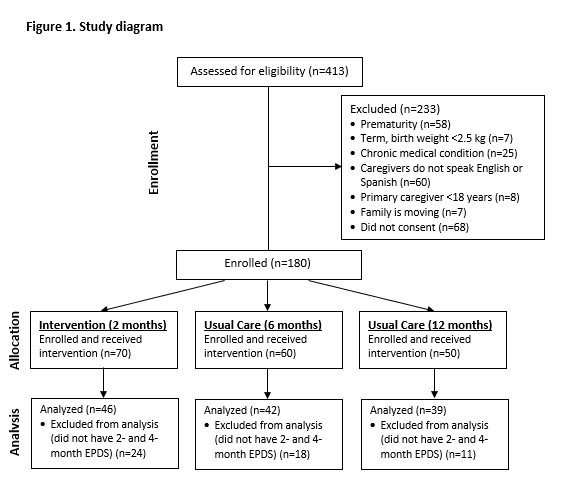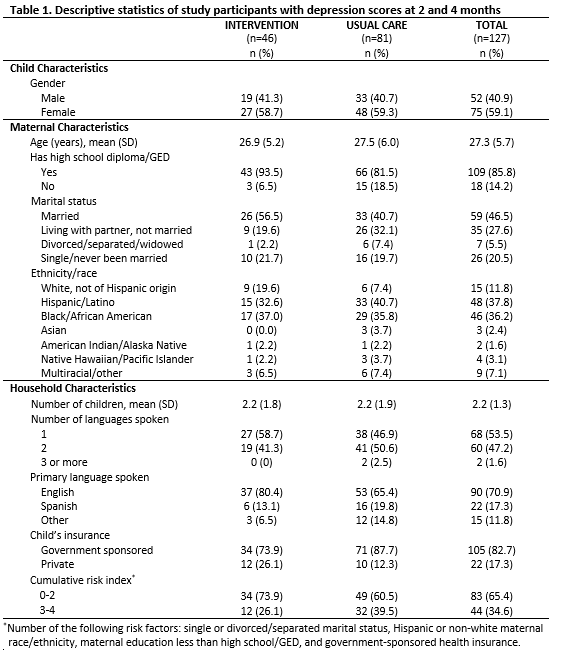General Pediatrics: Primary Care/Prevention
Category: Abstract Submission
General Pediatrics I
593 - Impact on Maternal Postpartum Depressive Symptoms of a Primary Care Intervention Promoting Early Language: A Pilot Study
Saturday, April 23, 2022
3:30 PM - 6:00 PM US MT
Poster Number: 593
Publication Number: 593.208
Publication Number: 593.208
Gretchen Domek, University of Colorado, Aurora, CO, United States; Lauren Heller Szafran, Johns Hopkins Bloomberg School of Public Health, Denver, CO, United States; Andrea M. Jimenez-Zambrano, University of Colorado, Aurora, CO, United States; Lori Silveira, University of Colorado School of Medicine, Aurora, CO, United States

Gretchen Domek, MD, MPhil (she/her/hers)
Associate Professor
University of Colorado Anschutz Medical Campus
Aurora, Colorado, United States
Presenting Author(s)
Background: Maternal depressive symptoms are an important risk factor for adverse child outcomes, especially in the perinatal period. Parenting interventions provided within pediatric primary care have been shown to reduce maternal depressive symptoms, likely mediated by enhanced parental responsiveness and improved parent-child relationships.
Objective: We studied whether introducing finger puppets in the primary care setting to promote infant language improves maternal postpartum depressive symptoms.
Design/Methods: This research was part of a larger pilot study where the intervention was introduced in a staggered manner at different time points to all participants. (Figure 1) An intervention cohort was enrolled and given a puppet at the 2-month well visit. Two usual care cohorts were enrolled at either the 6- or 12-month well visit as part of the larger study and were combined in this analysis. Eligible infants were born full-term, weighed at least 2.5kg at birth, and had no condition known to affect neurodevelopment. Depressive symptoms were assessed using the Edinburgh Postnatal Depression Scale (EPDS), which was administered by clinic providers as part of routine screening done at both the 2- and 4-month well visits. EPDS scores were obtained retrospectively through the electronic medical record and treated as both dichotomous and continuous variables.
Results: Included mothers (n=127) completed the EPDS at 2 and 4 months postpartum. (Table 1) Most children (83%) were on government-sponsored insurance. Mean EPDS scores and scores classified as possible depression (>10) did not differ between cohorts. (Table 2) However, the change in scores between visits was significantly different for intervention (n=46) versus usual care (n=81) participants (-1.1 vs. +0.4, p=0.001). More intervention scores improved (n=17, 37%) compared to usual care (n=14, 17%), while more usual care scores worsened (n=28, 35%) compared to intervention (n=6, 13%) (p=0.008).Conclusion(s): We found that finger puppets distributed at the 2-month infant well visit were associated with improved maternal depression score trajectories between 2 to 4 months postpartum. Puppets provide a simple, low-cost way to promote maternal-infant interactions and parenting behaviors that may also help improve maternal postpartum depressive symptoms. While our previous research has suggested improvements in parenting and child development, this study emphasizes that we should also explore maternal outcomes. Larger studies should determine if effects are replicable, generalizable, and translate into better clinical outcomes.
Figure 1. Study diagram
Table 1. Descriptive statistics of study participants with depression scores at 2 and 4 months
Objective: We studied whether introducing finger puppets in the primary care setting to promote infant language improves maternal postpartum depressive symptoms.
Design/Methods: This research was part of a larger pilot study where the intervention was introduced in a staggered manner at different time points to all participants. (Figure 1) An intervention cohort was enrolled and given a puppet at the 2-month well visit. Two usual care cohorts were enrolled at either the 6- or 12-month well visit as part of the larger study and were combined in this analysis. Eligible infants were born full-term, weighed at least 2.5kg at birth, and had no condition known to affect neurodevelopment. Depressive symptoms were assessed using the Edinburgh Postnatal Depression Scale (EPDS), which was administered by clinic providers as part of routine screening done at both the 2- and 4-month well visits. EPDS scores were obtained retrospectively through the electronic medical record and treated as both dichotomous and continuous variables.
Results: Included mothers (n=127) completed the EPDS at 2 and 4 months postpartum. (Table 1) Most children (83%) were on government-sponsored insurance. Mean EPDS scores and scores classified as possible depression (>10) did not differ between cohorts. (Table 2) However, the change in scores between visits was significantly different for intervention (n=46) versus usual care (n=81) participants (-1.1 vs. +0.4, p=0.001). More intervention scores improved (n=17, 37%) compared to usual care (n=14, 17%), while more usual care scores worsened (n=28, 35%) compared to intervention (n=6, 13%) (p=0.008).Conclusion(s): We found that finger puppets distributed at the 2-month infant well visit were associated with improved maternal depression score trajectories between 2 to 4 months postpartum. Puppets provide a simple, low-cost way to promote maternal-infant interactions and parenting behaviors that may also help improve maternal postpartum depressive symptoms. While our previous research has suggested improvements in parenting and child development, this study emphasizes that we should also explore maternal outcomes. Larger studies should determine if effects are replicable, generalizable, and translate into better clinical outcomes.
Figure 1. Study diagram

Table 1. Descriptive statistics of study participants with depression scores at 2 and 4 months

